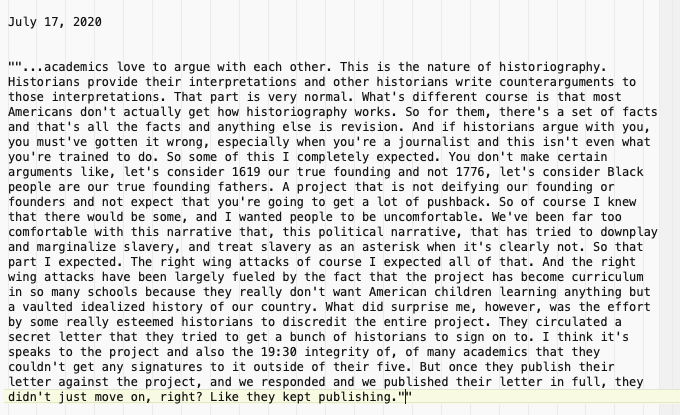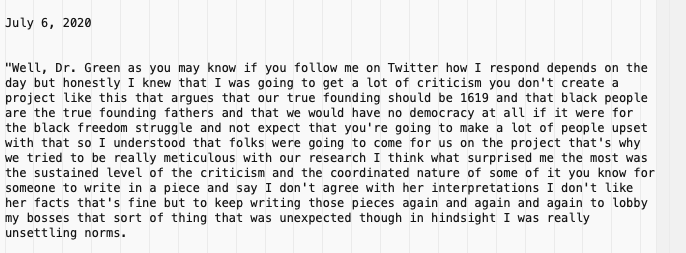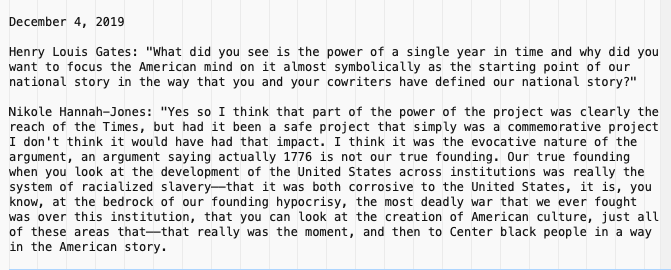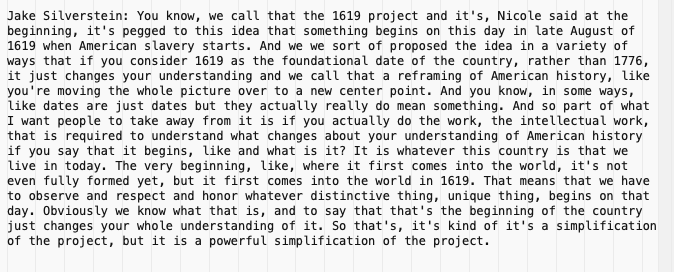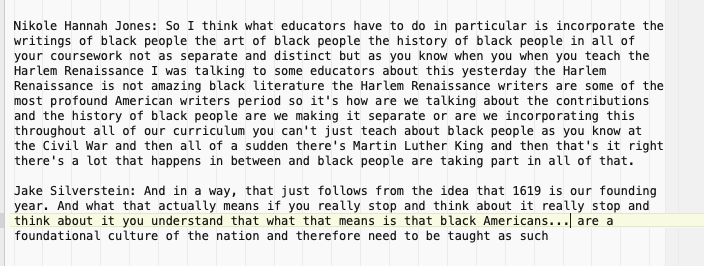Annoyingly, Nikole Hannah-Jones blocked me on Twitter today before posting more mischaracterizations of our recent disagreements about 1619 vs 1776. I'd hoped and intended to leave things at my last thread. Now I'll post videos corroborating my position.
Lest there be any confusion, I want to be clear that I do not favor banning the project from schools or the president's attacks on NHJ.
Indeed, this week a hs teacher sent me a link to a video presentation by a student who read The 1619 Project and my essay about it. My discourse and debate-loving self found it so heartening.
She studied the history on her own and by being taught the debate. And she reached her own nuanced conclusion about whether Americans ought to think of their true founding as 1619 or 1776.
Unlike Trump, I believe The 1619 Project has a place in schools so long as the strongest criticism of it is taught, too--that teaching such public controversies is a good thing if done well. Some students learn *best* from engaging in debates about a subject.
What's more, I have confidence in my side of that debate: that considering 1776 as America's true founding is better and more inclusive (full argument here theatlantic.com/ideas/archive/…). Teaching the debate highlights how unifying the civic creed expressed in 1776 can be today.
That debate has become distorted. Everyone always agreed 1776 is the literal political founding. For many months, everyone acknowledged the Project made the provocative claim that Americans ought to consider their country's "true" or symbolic founding to be 1619 instead
Jones repeatedly cited that metaphorical claim about the most "true" founding year *as a specific reason* she knew that the Project would elicit disagreement and provoke criticism and debate.
Now she treats people like me, who believe 1776 is not merely the literal founding and birth date, but better considered the symbolic founding as well, as if we fabricated contrary claims.
As noted, I'd planned to let the issue rest with a thread I posted earlier this week threadreaderapp.com/thread/1307053… But NHJ deleted a Tweet of hers I quoted in that thread. Today, she blocked me and Tweeted additional wrongheaded characterizations.
She writes, "I must acknowledge being imprecise in my casual language on Twitter, using true as in *literal and actual* and true as in *symbolic* when discussing the project, but the project nor I never argued 1619 as our literal founding."
Accurate. But the debate is about the best symbolic founding! And everything I have argued is consistent not just with stray Tweets, but with multiple videotaped statements she has made in public appearances, & that the editor of the NYT Magazine, Jake Silverstein, made as well
July 17, 2020
July 6, 2020:
December 4, 2019:
This last one is October 8, 2019 at an event where Jake Silverstein, the editor of the NYT magazine, is on stage with NHJ. Two clips are relevant. Here's the first:
Those are the claims I & others NHJ has criticized have always been debating. What do I want? For the symbolic debate about whether 1776 or 1619 is the better symbolic founding date to be had on the merits rather than short-circuited by the canard we're arguing with a straw man
• • •
Missing some Tweet in this thread? You can try to
force a refresh


